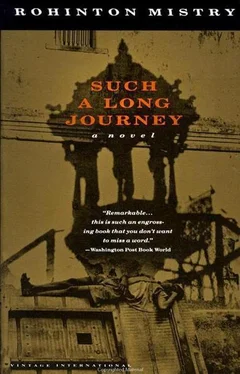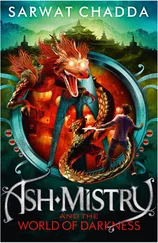‘I have thought about that, I have a plan. What you must do is stop your jokes and teasing with everyone. At the same time, I will start telling people that poor Dinshawji’s health is not good again, he is feeling completely under the weather.’
‘I would prefer to be feeling under Laurie’s skirt.’ The attempt at humour was frail, but it was a hard habit to break.
‘No more jokes, you agreed,’ said Gustad sternly.
‘Sorry, sorry yaar. Just with you, privately.’
‘OK. So I’ll spread the story tomorrow. All the fellows will be sympathetic, everything will be fine. Can you manage it?’
‘Of course. Let me tell you, it’s more difficult to be a jovial person all the time than to be a quiet, sickly one.’ The truth of Dinshawji’s words was sharp and cruel. They finished their tea silently and left.
From the next morning, Dinshawji changed utterly. Everyone’s heart went out to the grave individual, suddenly fragile and spent, who greeted them with only a quiet hallo. When Gustad came across him later in the day, he was surprised at how authentically Dinshawji projected his new image. Till he remembered that it seemed authentic because Dinshawji was no longer playing a role; reality, at last, had caught up with him; and Gustad felt awful for confiscating his mask.
The tap was re-soldered to the bunghole. Gustad walked home from the Horaji’s repair shop with the water drum upon his shoulder. Dilnavaz was waiting anxiously to tell him about the visitor who would call again at nine p.m. ‘He was asking for you,’ she said. ‘Would not tell me anything. Very strange fellow. Barefoot, and all paint on his hand, as if he was playing Holi with coloured powder. But Holi festival is seven months away. I hope that shameless Bilimoria has not sent him with more troubles for us.’
Gustad could guess who it was. Later, he was able to reassure Dilnavaz, when the man returned as promised: ‘Don’t worry, I told him to come. To fix that stinking wall.’
He went with the pavement artist into the compound. ‘So. You finally made up your mind to leave Flora Fountain?’
‘What to do,’ said the pavement artist. ‘After the trouble that day, police began harassment. Making me move from here to there, this corner to that corner. So I decided to come and see the place you were telling about.’
‘Good,’ said Gustad, ‘you will like it.’ They went outside the gate and the artist inspected the wall. He ran his hand over the surface, feeling with his fingertips. ‘Smooth black stone,’ said Gustad encouragingly, ‘perfect for your pictures. Wall is more than three hundred feet long. And lots of people pass by every day.’ He pointed to the twin towers next to Khodadad Building: ‘To go to those offices. Then there is a bazaar also over there, further down. With expensive jewellery shops. Lots of rich people travel this road. On that side, about twenty minutes away, there are two cinemas. Monday will be no problem, I can guarantee.’
The pavement artist completed his inspection by taking a crayon from his satchel and sketching briefly. ‘Yes. Quite good.’ He wrinkled his nose. ‘But stinks very much.’
‘That’s true,’ said Gustad. He had been wondering how long before the artist said something. ‘Shameless people treat the wall like a roadside lavatory. Look! There’s one now!’
At the far end, a figure stood motionless in the shadows, silent except for a soft hiss. From his centre flowed a liquid arc glinting by the light of the street lamp. ‘Hai!’ shouted Gustad. ‘ Bay-sharam budmaas ! I’ll break your huddi, you rascal!’ The arc terminated abruptly. The man’s hand shook twice and performed a deft movement in his trousers before he slipped away.
‘You saw?’ said Gustad. ‘Shameless. That’s the reason for the stink. But once you draw your holy pictures, no one will dare.’ He glimpsed hesitation on the other’s face and hastened to add, ‘First we will have the whole wall washed and cleaned.’
The pavement artist thought for a bit, then agreed. ‘I can start tomorrow morning.’
‘Good, good. But one question. Will you be able to draw enough to cover three hundred feet? I mean, do you know enough different gods to fill the whole wall?’
The artist smiled. ‘There is no difficulty. I can cover three hundred miles if necessary. Using assorted religions and their gods, saints and prophets: Hindu, Sikh, Judaic, Christian, Muslim, Zoroastrian, Buddhist, Jainist. Actually, Hinduism alone can provide enough. But I always like to mix them up, include a variety in my drawings. Makes me feel I am doing something to promote tolerance and understanding in the world.’
Gustad was impressed. ‘How do you know about so many religions?’
The artist smiled again. ‘I have a BA in World Religions. My speciality was Comparative Studies. Of course, that was before I transferred to the School of Arts.’
‘Ah,’ said Gustad. They agreed to meet next morning, very early, when the street-sweeper arrived. Later that night, he said to Dilnavaz, ‘Tell that worthless son of yours who kicked IIT in the face. Tell him when he comes next time to visit you — that poor wandering pavement artist has two BAs.’
At dawn, after the street-sweeper cleaned up the nocturnal deposits, Gustad convinced him with the help of a five-rupee note to wash down the wall. He got him a stiff wire brush to scrub it well. The artist arrived with his satchel, a Petromax lamp, and a small roll of bedding. ‘The sun will come out now,’ said Gustad, ‘wall will soon be dry.’
Three hours later, as he left for the bank, the artist was hard at work on his first drawing. He watched, trying to identify the subject, and finally interrupted, ‘Excuse me. Which one is that, if you don’t mind my asking?’
‘Trimurti. Of Brahma, Vishnu and Shiva, the gods of creation, preservation and destruction. If that is all right with you, sir? Or I can do something else.’
‘Oh no, it’s fine,’ said Gustad. He would have preferred a portrait of Zarathustra to inaugurate the wall, but realized that this triad would have a far-reaching influence in dissuading the urinators and defecators. When he returned in the evening, the artist had lit the Petromax. The Trimurti was complete, as well as a grim, sanguinary Crucifixion. A representation of the Jumma Masjid was in progress — since Islam prohibited portraits, he restricted himself to drawings of the famous mosques.
‘Hope it does not rain,’ said Gustad. He tested the air with a deep breath. ‘So far, no stink.’ The artist nodded without looking up from his work. ‘But you will have to be careful tonight. It’s the first night, people do not know yet that there are holy pictures here.’
‘That’s OK, I will warn them,’ said the artist. ‘I am going to work all night.’ He set down a green crayon which started to roll away down the pavement. Gustad stopped it, replaced it in the box. ‘Excuse me sir. Please, one request. Is it OK if I break a twig from your neem every morning? To brush my teeth?’
‘Sure,’ said Gustad. ‘Everybody does that.’
During the night, the artist completed two more pictures: Moses descending with the Ten Commandments, and Ganpati Baba. As the sun was rising he added some flourishes to the latter’s flesh-coloured proboscis, then took up his white crayon to write in the commandments on Moses’s stone tablets.
Over the next few days, the wall filled up with gods, prophets and saints. When Gustad checked the air each morning and evening, he found it free of malodour. Mosquitoes and flies were no longer quite the nuisance they used to be; with their breeding grounds drying up, the numbers diminished dramatically. And in Khodadad Building, Odomos became a thing of the past. Dilnavaz and Gustad put away the flat dishes, khumchaas, tapaylis from under the light bulbs; there was no further use for those mosquito traps either.
Читать дальше












